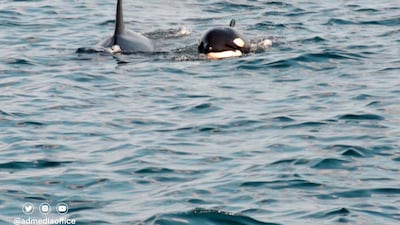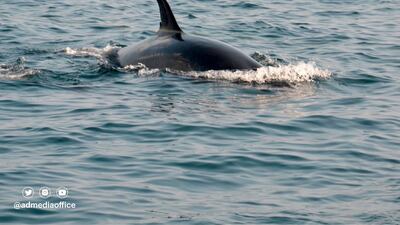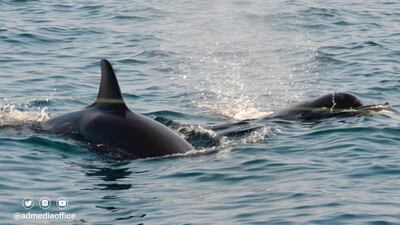A pair of killer whales have been seen making a splash off the coast of the UAE capital.
The sighting was made by a team from Environment Agency Abu Dhabi, who shared images of the vast marine creatures on social media.
Killer whales, also known as orcas, are among the most well-travelled of marine life, adapting to both cooler climes and the warmer waters of the Middle East, and are found in all oceans of the world.
Despite their mobile nature, sightings of the mammals in the Emirates remain rare.
A pod of eight of the mammals was seen near Moon Island, about 70km off the coast of Dubai in 2019. It was said to be the first sighting for 11 years.
Orcas are renowned for their distinctive appearance, but despite their more common name, they are not whales but the largest members of the dolphin family.
The biggest killer whale recorded weighed 10 tonnes and was almost 10 metres long.
They feed on a variety of fish, mammals and sea birds, and their highest concentration occurs in the north-east Atlantic around the Norwegian coast, as well as the North Pacific and the coast of Antarctica.
The environment agency hailed the sighting as testament to the “health and quality of the emirate's waters” and its flourishing marine biodiversity
“This comes as a result of the policies, procedures and administrative measures taken by the Agency to protect marine life,” the environment agency said.
Abu Dhabi is stepping up efforts to protect marine life.
In August, the agency announced plans to build the Middle East’s most advanced research ship to study previously unchartered waters at least 10 metres deep in the Arabian Gulf.
Carrying up to 30 personnel, the 50-metre vessel has an array of cutting-edge equipment such as five laboratories to process samples onboard, a remotely occupied vehicle and facilities to allow for crew members to carry out scuba diving missions.
The ship will enable the agency to complete comprehensive marine surveys including of the deepwater marine ecological baseline; fisheries resources assessment; deepwater habitat of coral and seagrass; marine water and sediment quality; and megafauna of the likes of cetaceans such as dolphins, dugong and turtles.
Sheikh Hamdan bin Zayed, chairman of Environment Agency Abu Dhabi, said the investment was vital to the agency’s drive to protect marine biodiversity across the country.
“After the resounding success we have achieved with the dramatic improvement of fish stock numbers in Abu Dhabi waters, due to new policies and legislation, we are proud to be continuing our research on fisheries and all marine biodiversity to maintain the momentum of the significant work we have done so far,” he said.



